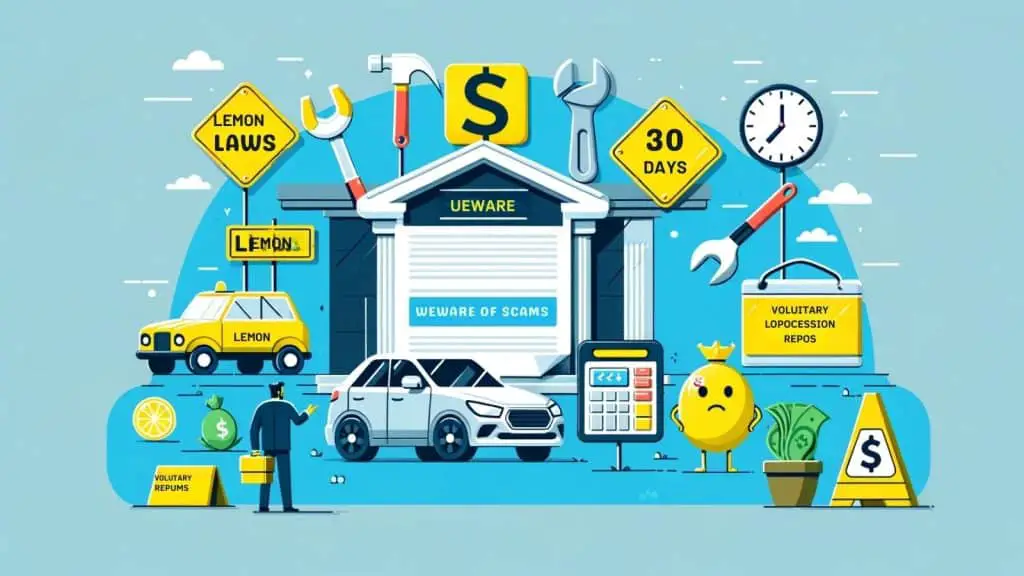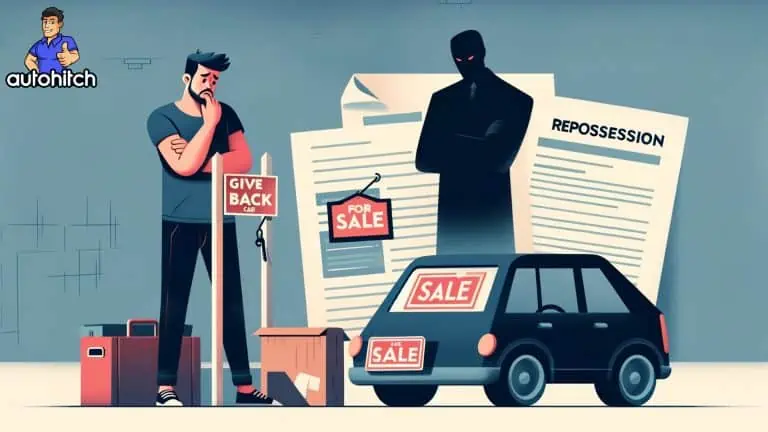If you’ve fallen behind on your car payments, you may wonder if you can give back the car to get out from under the loan and avoid repossession of the car.
Simple Answer:
Unfortunately, most car dealers and lenders won’t simply take back a financed vehicle. But you still have options to avoid further financial damage.
Table of Contents
Relevant Articles to Read:
- How Long Does a Voluntary Repo Stay on Your Credit
- Can You Transfer a Car Loan to Someone Else
- What Is Title Pawning And How Does It Work
- Can I file For Bankruptcy And Keep My Car
- The Complete Guide to Car Repossession
Pros and Cons of Voluntary Repossession
| Pros of Voluntary Repossession | Cons of Voluntary Repossession |
|---|---|
| Avoids the stress of an involuntary repossession process | May still negatively affect your credit score |
| Can reduce the overall deficiency balance due to lower fees | The remaining loan balance must be paid off despite the car’s return |
| Provides more control over the timing and terms of the car’s surrender | May have to continue paying additional fees and the deficiency balance |
| Potentially viewed more favorably by future lenders than an involuntary repossession | A voluntary repossession will still be listed on your credit report |
Can You Return a Financed Car?
In most cases, no. Once you sign the contract and drive the car off the lot, a dealer is not obligated to take back a financed car.
Frankly,
Dealers don’t want to take cars back right now because car prices are plummeting. If they relieve you of your obligation and resell the car at the current lower prices,
they lose money!
Some dealerships do have return policies, but they only allow vehicle returns under limited circumstances.

Returns may be allowed if:
- The car is defective and qualifies as a lemon under your state’s lemon laws. This typically requires multiple failed repair attempts.
- The dealer misled you during the sales process through tactics like yo-yo financing scams. You can report fraud to the Federal Trade Commission.
- The dealer’s written return policy specifically allows returns within a short timeframe, like 30 days. But you’ll likely pay fees and depreciation costs.
- The lender agrees to a “voluntary repossession” to avoid a damaging involuntary repo. But deficiencies and fees often still apply.
Outside of those cases, you can’t simply return a financed car free and clear. The lender owns the car until you finish paying off the loan.
Alternatives to Returning a Car You Can’t Afford
Instead of returning your financed vehicle, consider these options to relieve the financial burden:
Giving Back Your Car Alternatives (Quick Reference Table)
| Alternative Option | Benefits | Considerations |
|---|---|---|
| Refinancing the Car Loan | Potentially lower interest rates and monthly payments | May lead to paying more in interest over time if extended |
| Selling the Car Privately | Higher sale price compared to trade-in offers | Requires effort and time to find a buyer and complete the sale |
| Trading in for a Cheaper Model | Quick transaction and immediate financial relief | Likely lower trade-in value; may result in negative equity |
| Lease Transfer | Release from monthly payments without selling | Must find someone to take over the lease; subject to credit approval |
| Filing for Bankruptcy | Can potentially discharge the debt or reorganize it for easier repayment | Severe negative impact on credit score; long-term financial repercussions |
1. Refinance the Car Loan
Refinancing involves getting a new loan with better terms from a different lender to pay off your current loan. This can potentially:
- Lower your interest rate to reduce the monthly payments
- Extend your repayment term to lower payments
- Consolidate payments if you’re upside down on your loan
Shop around to compare car loan refinance rates. Check your credit first, since you need good credit to qualify.
2. File for Bankruptcy
Filing for bankruptcy can provide relief from unaffordable auto loan debt in some cases. There are two main options:
- Chapter 7 Bankruptcy: With Chapter 7, you can voluntarily surrender the financed vehicle and any remaining loan balance will become an unsecured debt that’s discharged.
Chapter 13 Bankruptcy works a bit differently:
Under Chapter 13, you may have a few options:
- You can keep the car with reduced payments by restructuring the loan.
- You can pay only the actual value of the car through a “cramdown” and discharge the remainder of the loan.
Things to Consider:
Bankruptcy stays on your credit report for up to 10 years. So first, explore all other options and meet with a credit counselor before taking this route.
3. Sell the Car Yourself
Selling the car is often the best way to get out from under the loan. Use sites like Kelley Blue Book to determine your car’s value.
If you sell it for less than you owe, you’ll have to pay the difference to the lender. But it’s still better than defaulting or sinking more money into an unaffordable loan.
Must Read Article: Is It Illegal To Sell A Car With A Lien on It?
4. Voluntary Repossession
You can call your lender and surrender the car before they repossess it. This avoids fees but still hurts your credit. Deficiencies often remain too.
Get a definitive agreement on how the lender will report and handle deficiencies before surrendering the car.
5. Lease Takeover
For leased cars, transfer your lease to someone else. You can use lease-swap sites to find takers. This releases you from payments.
Compare your buyout amount to the car’s value if you leased to own. Consider buying and then selling if equity allows.
Recent Trends in Car Repossessions
The number of car repossessions has been rising nationwide over the past couple of years. Here are some key statistics on the increase:
- In December 2022, 5.67% of subprime borrowers were at least 60 days delinquent on their auto loan payments. This is more than double the rate of 2.58% in May 2021, which was a 7-year low.
- Approximately 1.5 to 1.8 million vehicles are repossessed each year in the United States. This number dropped during the pandemic but rose again in 2022.
- The volume of repossessed vehicles sold at auctions increased by nearly 11% in 2022 compared to 2021. However, it still remains more than 25% less than 2019 levels.
- As of February 2023, the rate of car repossessions nationwide had jumped 20.4% compared to the previous year.
- In the first quarter of 2023, foreclosure filings were up 6% from the prior quarter and 22% from a year ago. Auto loan delinquencies are contributing to this rise.
- In April 2023, 5.3% of subprime auto loans were delinquent, up from 2.6% two years prior.
While repossessions are increasing, most experts say they are not expected to reach crisis levels.
They cite factors like the strong job market and high used car values that are helping to keep overall default rates relatively low compared to historical averages.
However, prolonged inflation and a dramatic increase in personal debt are putting a growing strain on household budgets, so in the end, who knows?
Protecting Your Credit if You Return a Car
Any option that removes you from the loan will damage your credit, especially if you still owe money after surrendering or selling the car. Here are some tips to minimize credit harm:
- Keep all other accounts current to offset the blow.
- Pay any deficiencies from the sale or repo promptly.
- Refinance other debts to free up monthly cash.
- Sign up for credit monitoring to track your recovery.
- Hold off financing another car right away. Save up a down payment first.
A repossession can stay on your credit report for up to 7 years, severely damaging your credit score. But responsible actions can demonstrate you’ve learned from the situation.
Key Factors That Lead to Unaffordable Car Loans
Several scenarios can leave you stuck with payments you can no longer afford:
- Taking out a loan that’s too large relative to your income. Monthly payments should be 10-15% of your take-home pay at most.
- Paying too much for a used car because you focused on monthly payments rather than overall cost.
- Experiencing an income disruption from a job loss, reduced hours, or an emergency expense that impacts your budget.
- Getting an auto loan with a high interest rate because of poor credit or failing to shop around with multiple lenders.
When buying a car, only commit to payments you’re confident you can make even if your situation changes. Consider all associated costs beyond the monthly payment.
FAQs: Returning a Financed Car You Can’t Afford
Can you return a car the next day?
Probably not. Most dealer return policies exclude vehicles purchased with financing. You would have to prove fraud or a lemon.
What happens if I just stop making payments?
The lender can hire a repo agent or remotely disable your car. An involuntary repo severely damages your credit and will incur fees.
Can I trade in a car I still owe money on?
Yes, but you’ll likely roll the remaining “negative equity” into the new loan, raising payments on the next car. Pay down the loan first if possible.
Should I just file for bankruptcy instead?
Bankruptcy should be a last resort. Explore all options like refinancing and budgeting before assuming your situation is hopeless. Meet with a credit counselor.
What other transportation options exist if I return the car?
Consider cheaper options like public transportation, carpooling, bicycling, or purchasing an affordable used car in cash once you save up without monthly payments.
The Bottom Line
Returning a financed car is rarely a simple or cost-free option. But acting quickly and responsibly once you realize you can no longer afford the loan can help minimize damage to your finances and credit score.
This includes exploring alternatives like refinancing or selling the car instead of defaulting or accepting voluntary repossession as an inevitability. With a proactive approach, you can take control and recover from an unaffordable auto loan situation.
Sources and Citations
- https://www.titleloanser.com/stats/car-repossession-statistics/
- https://abc11.com/cars-repossessed-inflation-economy-job-cuts/12755028/
- https://www.nbcnews.com/business/consumer/foreclosures-car-repos-rising-why-americans-are-living-financial-cliff-rcna80638
- https://www.coxautoinc.com/market-insights/loan-defaults-and-repossessions-returned-to-historical-norms-in-2022/
- https://autos.yahoo.com/car-repossessions-rise-120000818.html
- https://www.debt.org/faqs/repossession/
- https://www.autoinsurance.org/can-you-return-a-financed-car-without-getting-a-penalty/
- https://www.way.com/blog/want-to-return-a-financed-car-heres-when-you-can-do/



